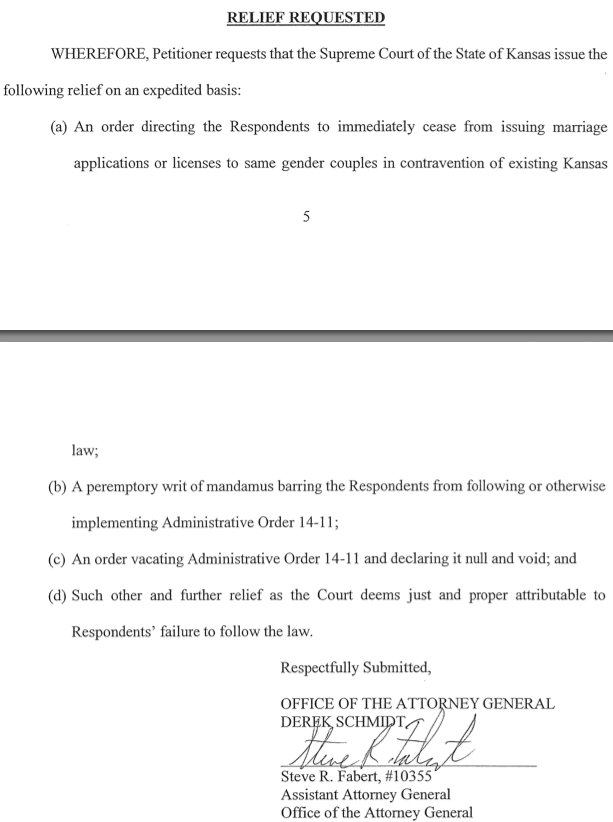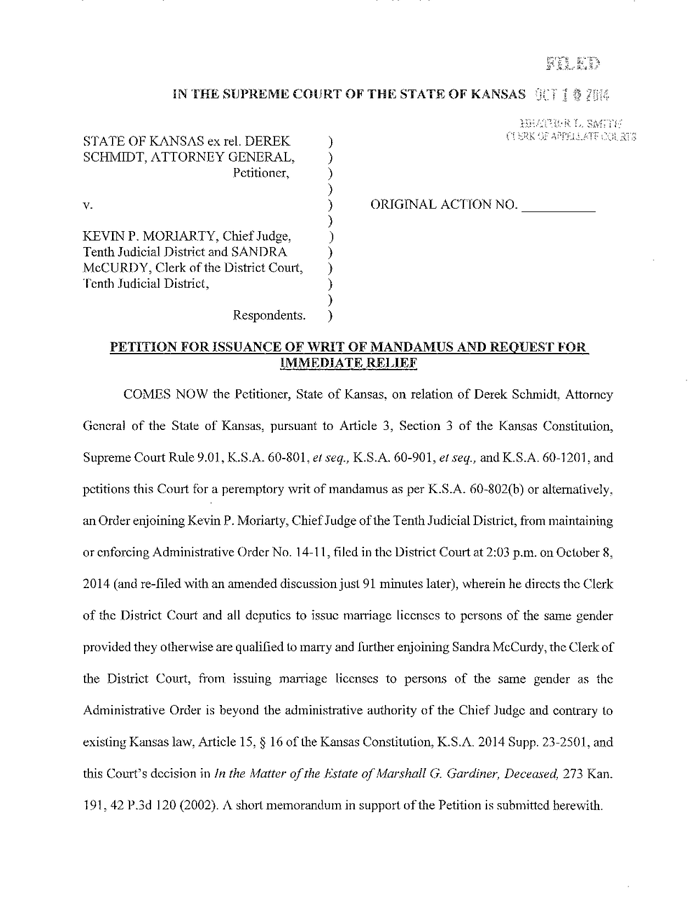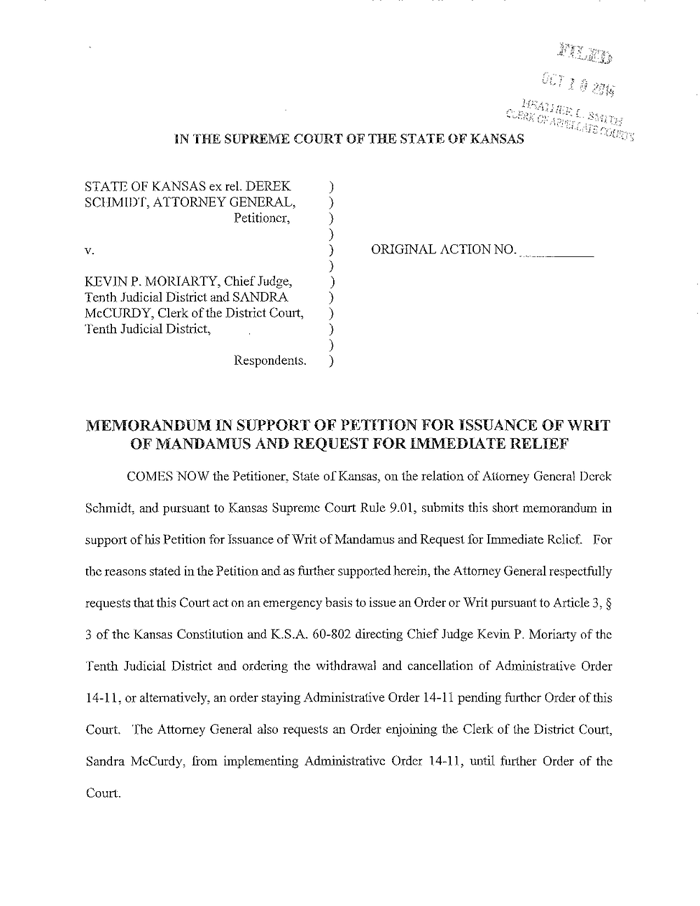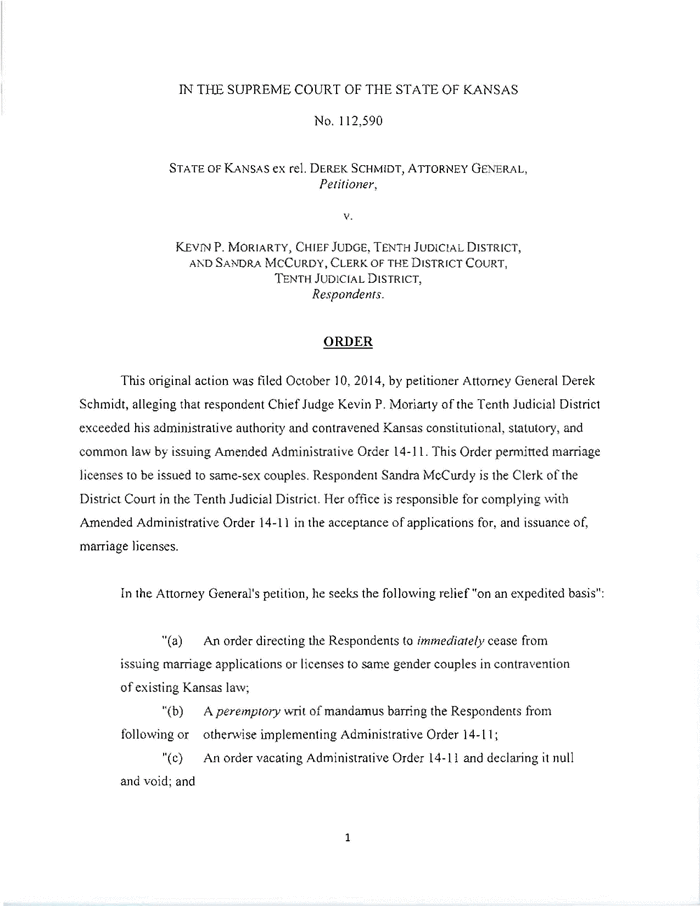
The Kansas Supreme Court on Friday evening put a temporary hold on the granting of marriage licenses to same-sex couples in Johnson County, but allowed applications for such licenses to continue.
In response to a request from the Kansas attorney general earlier Friday, the court issued the Friday evening order refusing to grant an immediate order that the licenses could not be issued in Johnson County — noting that "the Attorney General's right to relief on the merits is not clear."
Instead, the Kansas Supreme Court granted the temporary stay and set a schedule for a full briefing of the issues involved — including the question of "whether Kansas' state constitutional, statutory, or common law bans on same-sex marriage are permissible under the United States Constitution." The oral arguments will be held "at 10:00 a.m. on November 6, 2014," according to the court's order.
WASHINGTON — Kansas Attorney General Derek Schmidt has asked the Kansas Supreme Court to stop same-sex couples' marriages in Johnson County, Kansas.
Schmidt filed the request with the Kansas Supreme Court on Friday morning following a decision earlier in the week by a Johnson County District Court judge's decision to issue an administrative order for the county allowing same-sex couples to marry in the county.
The move, from Johnson County District Judge Kevin P. Moriarty, led to at least one wedding in the county on Friday morning, according to the Kansas City Star.
At 8:23 a.m. Kansas first same sex marriage is now completed.
"The Johnson County Court's decision is an outlier," Schmidt said in a statement accompanying his filing. "Numerous other Kansas Courts have concluded, as I have, that the law in Kansas remains unchanged and same-sex marriage remains unlawful unless and until a Court of competent jurisdiction, deciding a properly presented case or controversy, holds otherwise as a matter of federal constitutional law. Because that has not happened, I have concluded the Judge's decision to order the issuance of licenses is unlawful and I now have no choice but to ask the Kansas Supreme Court to set it aside."
In Moriarty's order, issued on Oct. 8, he relied upon the finality of the decision in the challenge to Utah's ban on same-sex couples' marriages, noting the the 10th Circuit Court of Appeals ruling against the ban would apply to any challenge to Kansas' ban.
Moriarty stated that although no court had specifically ruled Kansas' ban unconstitutional, "Our citizens are entitled to exercise their constitutional rights and our administration of justice should be free of any ambiguity or inconsistency in the administration of justice, including the issuance of marriage licenses."
The wedding cake for Kansas first same sex marriage.
Kansas Attorney General Schmidt's full statement:
"On Wednesday afternoon, the Chief Judge of the District Court of Johnson County declared a provision of the Kansas Constitution invalid and ordered the issuance of marriage licenses to same-sex couples in violation of Kansas law as it currently exists. No lawsuit was pending that asked the Judge to evaluate current Kansas law, and there was no opportunity for the State of Kansas or anybody else to challenge or even have input into the Judge's administrative order before it was issued. This is not a proper way to determine whether a provision of the Kansas Constitution remains in force and effect.
"The Johnson County Court's decision is an outlier. Numerous other Kansas Courts have concluded, as I have, that the law in Kansas remains unchanged and same-sex marriage remains unlawful unless and until a Court of competent jurisdiction, deciding a properly presented case or controversy, holds otherwise as a matter of federal constitutional law. Because that has not happened, I have concluded the Judge's decision to order the issuance of licenses is unlawful and I now have no choice but to ask the Kansas Supreme Court to set it aside.
"Monday's decision by the U.S. Supreme Court declining, for now, to settle the dispute about whether the U.S. Constitution renders state-law prohibitions on same-sex marriage unenforceable has caused considerable confusion and legal uncertainty in Kansas and other states. This confusion was compounded when only two days later Justice Kennedy issued a stay halting same-sex marriages in Idaho. The U.S. Supreme Court's decision to refuse to consider the pending appeals has resulted in an inconsistent patchwork of how the U.S. Constitution is to be applied in different states throughout our country. In Kansas, the confusion and uncertainty have been made worse by this outlier decision that effectively renders the Constitution's meaning different from county to county.
"The situation is needlessly uncertain, is untenable and is unfair to all interested parties. Therefore, I have asked the Kansas Supreme Court to step in and put a halt to the actions in Johnson County so that this important legal dispute can be settled in an orderly manner, with all the processes and safeguards afforded in litigation, that provides legal clarity and certainty to all involved.
"I am a strong advocate for an orderly resolution of this dispute in a way that can be accepted as legally correct and that allows the State to defend its Constitutional provision and its laws."
Schmidt's request to the Kansas Supreme Court:




